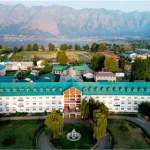In the quiet town of Riverview, where time seemed to linger and sunsets painted the streets gold, two brothers grew up under the sa me roof yet walked vastly different paths. Arjun, the elder, was the embodiment of brilliance—his charm effortless, his achievements dazzling, his laughter magnetic. He moved through life with the ease of a river, carving admiration wherever he went. Aman, the younger, lived in the silences Arjun left behind, his world dimmed by a shadow that was not his own. Though he loved his brother, the ache of comparison gnawed at him, unspoken yet relentless.
The ache sharpened one humid afternoon during exams. Aman, hunched over his paper, wrestled with every question as though the numbers mocked his efforts. Mr. Sharma, his math teacher, passed by and paused. “Aman,” he said with a faint sigh, “you’d do well to follow in Arjun’s footsteps. He never struggles with this.”
The words pierced like splinters under the skin, festering long after Mr. Sharma walked away. Aman’s fingers trembled as he gripped his pen, his vision blurring as the paper before him turned into a canvas of inadequacy. Why did his best always feel insufficient?
At home, the air buzzed with pride as his father spoke animatedly about Arjun’s latest triumph. Aman stood in the doorway, hesitating, holding his breath as though the simple act of stepping into the room might shatter something fragile within him.
“Dad,” Aman began tentatively, his voice a whisper against the laughter in the room. “I… I tried my best in the exam today.”
His mother turned to him, her smile tender but tinged with sadness. “Your best is always enough, Aman,” she said, brushing a stray strand of hair from his face.
But his father’s voice carried an edge of expectation. “That’s good, son,” he said, his smile kind but distant. “Just keep at it. You wouldn’t want to fall too far behind Arjun, would you?”
The words echoed in Aman’s mind long after he retreated to his room. Sitting on his bed, his sketchbook lay beside him, untouched. His fingers traced the worn edges, yearning for the solace of creating something his own. He whispered to the stillness, “Why must I always follow his road?”
Years unfurled like pages in a book. Aman grew older, but the shadow of comparison stayed. Every achievement felt like a whisper drowned out by Arjun’s thunderous applause. And yet, in his quiet moments, he turned to his art—sketches, poetry, fragments of himself etched onto paper, longing for a world where he could be seen.
One evening, as Aman sat absorbed in his sketchbook, Arjun entered his room. For a moment, neither spoke. Arjun’s gaze fell on the scattered notebooks, the half-finished poems, the sketches that brimmed with unspoken stories.
“Hey,” Arjun said softly, breaking the silence. “You’ve got talent, Aman. Why do you hide it?”
Aman’s hand paused mid-sketch. “Because it’s not enough,” he murmured. “Not enough to matter. Not enough to be… seen.”
Arjun’s voice dropped, his tone uncharacteristically serious. “You’ve spent so long living in my shadow that you forgot your light. What’s your dream, Aman?”
The question hung in the air like a fragile thread. Aman swallowed hard, his voice quivering as he replied, “I love art. And words. They’re the only place I feel… free.”
Arjun smiled, his eyes glistening. “Then chase it. Don’t let anyone, not even me, define your worth.”
That night, Aman made a decision. When he told his parents of his plan to pursue art, his father hesitated. “Art?” he asked, his brows furrowed in concern. “It’s not a stable path, Aman. Are you sure?”
But Aman, for the first time, met his father’s gaze without wavering. “I need to find my own road, Dad. Please let me try.”
In college, Aman discovered himself anew. He painted the ache of his heart onto canvases, poured his struggles into poetry, and stumbled upon a love for rap—a raw, rhythmic outlet for his buried emotions. Late at night, he practiced alone, the words trembling at first, then surging with the power of truth. His lyrics told stories of loneliness, of shadows, of finding light where none seemed to exist.
One evening, his mother found him rehearsing. She sat beside him, her presence a quiet comfort. “Mom,” he said, his voice cracking, “I think I’ve finally found my voice.”
She smiled, tears brimming in her eyes. “Then let the world hear it, Aman. They’ve been waiting.”
Months later, Aman stood on the brink of a new chapter. He had been selected for Rhythm & Words, a national talent show. As the day of his performance arrived, he stood backstage, his heart pounding like a war drum. The lights were blinding, the stage vast, and the audience an ocean of unknown faces.
As the beat began, Aman closed his eyes and stepped into the rhythm. With every word, he peeled back the layers of his soul, his voice steady yet filled with the cracks of vulnerability:
“They called me a shadow, a name unseen,
Lost in his light, like a fading dream.
But shadows learn to stand alone,
To find their fire, to build their throne.”
The final note hung in the air like a prayer. For a moment, the room was silent. Then, like a tidal wave, applause crashed over him. Aman stood on that stage, tears streaming, a weight he had carried for years finally lifting.
Later, his father approached him, his eyes glistening with unshed tears. “Aman,” he said, his voice breaking, “you’ve always been remarkable. I’m sorry it took me so long to see it.”
Aman embraced his father, his heart full for the first time. “I just needed the chance to walk my own road, Dad.”
And so, Aman’s journey became not one of shadows but of light—a road not measured by comparison, but by the courage to be himself.
(Author is a columnist and can be reached at: [email protected])






